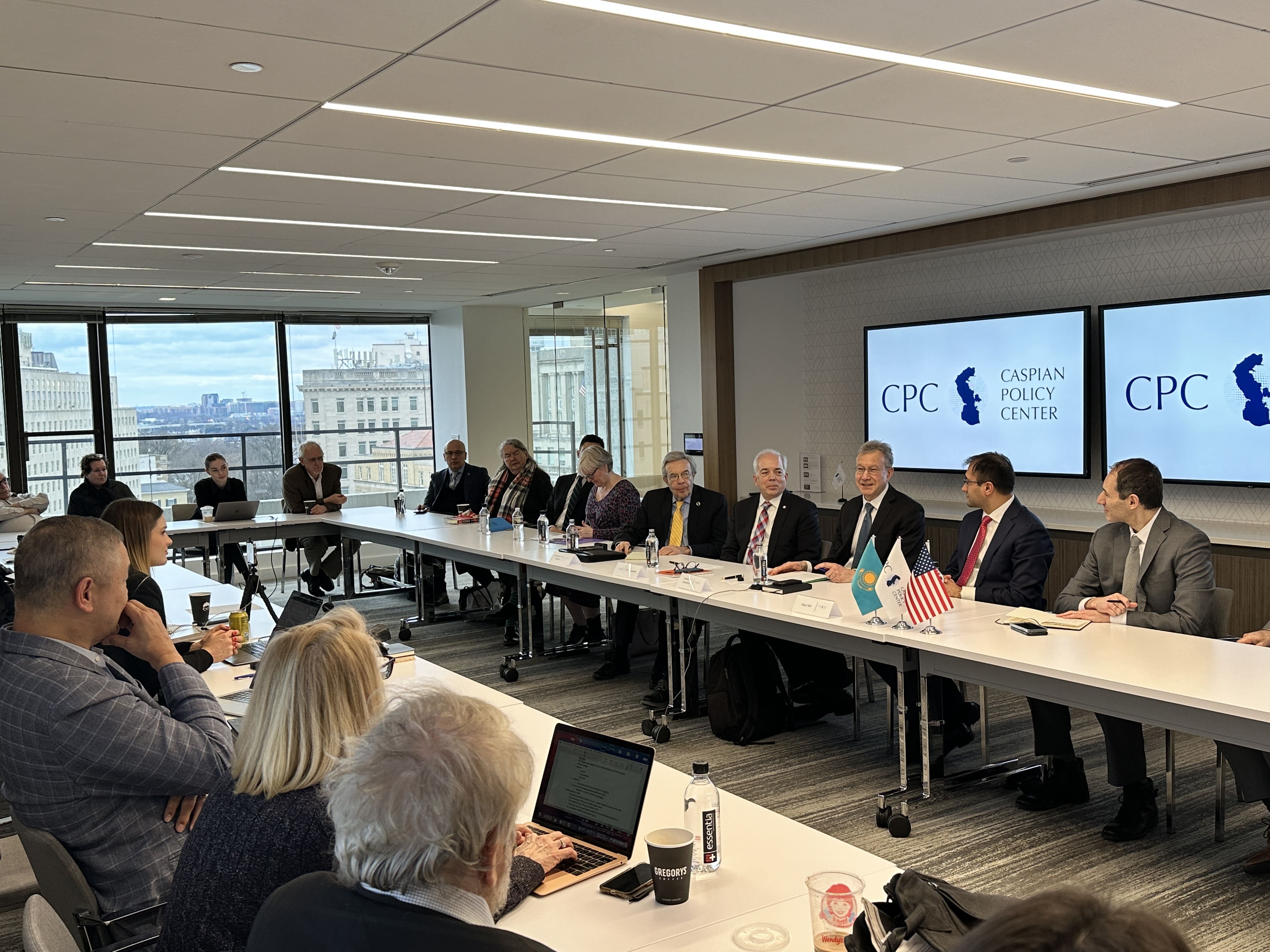Ambassador Rosenblum sees greater US investment and engagement in Kazakhstan’s future
Recent Articles
Author: Caspian Policy Center
01/05/2024
JANUARY 4, WASHINGTON D.C.- The United States has prioritized two things in its relationship with Kazakhstan, “Stability and sovereignty,” said U.S. Ambassador to Kazakhstan Daniel N. Rosenblum during a roundtable discussion at the Caspian Policy Center’s DC office, on January 4. Ambassador Rosenblum discussed the “tremendous progress” made between the United States and Kazakhstan in recent years, how Kazakhstan’s relations with Russia and China are changing, and what’s in store for the future of the U.S.-Kazakhstan bilateral partnership.
A culminating moment between Kazakhstan and the United States was the C5+1 meeting in New York in September. “But now what? Where are we going?” asked moderator Dr. Eric Rudenshiold, Senior Fellow at the Caspian Policy Center.
Ambassador Rosenblum sees the United States headed in two directions, “One is maintaining that level of engagement. Having another leader-level meeting ... And I know that because Kazakhstan is quite interested and pushing us to commit the same thing at the next UNGA .... hopefully, that can happen and then it becomes a sort of a tradition.”
The second direction, Rosenblum added, is to see that, “…the substantive commitments... get realized, and then grow into other things.” Specifically, the Ambassador highlighted the proposed B5+1 meeting, “which is sort of a private sector parallel structure [to the C5] of business associations and US businesses,” and also the proposed “critical minerals dialogue.”
The Trans-Caspian trade corridor, or so-called “Middle Corridor,” is an “economic priority for the government [of Kazakhstan] and for us as well,” he noted. However, although the development of the Middle Corridor is a key interest for the United States in the region, Ambassador Rosenblum explained that regional cooperation must be prioritized for this vision to become a reality. “The key challenge to developing the Middle Corridor and making it a viable alternative is to increase the speed of goods moving and to lower costs,” he specified, adding that such coordination, “will require the countries of the region to cooperate and harmonize their standards and their procedures for the movement of goods.”
“As President Biden mentioned in New York, the ‘Partnership for Global Infrastructure and Investment’ (PGI) would prioritize the Trans-Caspian corridor as one of the corridors we would put resources into,” Ambassador Rosenblum added. In fact, the United States has remained committed to financing these strategic infrastructure projects in Kazakhstan. “Our foreign direct investment (FDI) numbers were healthy as there was another $5 billion of new FDI [invested in Kazakhstan] in 2023,” said the Ambassador. “We are still the number two source of FDI after the Netherlands.”

With this increased economic stability, Kazakhstan has made a visible effort to comply with U.S. and international sanctions on its traditional trade partner, Russia.
“Since the sanctions were first imposed, back in 2022, Kazakhstan's record is good is a good one, both in terms of their ability to prevent sanctions evasion and, also, making sure that they're complying with all the sanctions when it comes to their domestic companies, relationships with Russian companies, Russian banks, and so on,” Ambassador Rosenblum commented when asked about Kazakhstan’s history of sanction compliance.
Ambassador Rosenblum addressed a wide range of issues while speaking to the large online and in-person audience, including Kazakhstan’s counter-terrorism efforts, the Kazakhstan-Taliban relationship, military-to-military engagement with the United States, and Kazakhstan’s energy sector.
“I'm a short-term pessimist and a long-term optimist because I do believe that fundamentally, Kazakhstan and the rest of Central Asia has tremendous potential to develop its human resources and its natural resources in a way that will benefit not only those countries but the broader region,” Ambassador Rosenblum concluded.